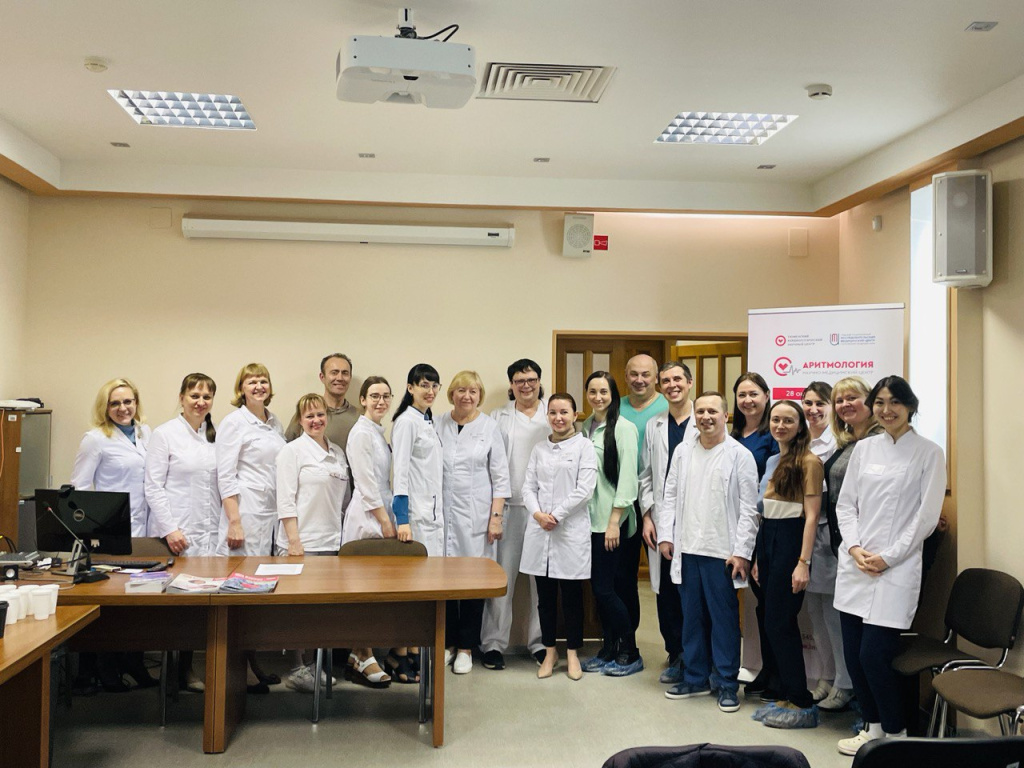It should be mentioned that “Arrhythmology” Scientific and Medical Center was opened at the base of our center last year. One of the items included in the aims of the center, besides comprehensive care to patients with heart rhythm disturbances, was combination of forces with other specialists to exchange knowledge, discuss challenging cases, optimize medical care provision concerning arrhythmological profile in accordance with the latest techniques. Therefore, colleagues-arrhythmologists from Tyumen Region Hospital No. 1, who supply a wide range of services for treatment of arrhythmia, including the most modern high-tech care, were invited to the first meeting.
During the first meeting, experience in administrating of domestic antiarrhythmic drug "Refralon" for relief of persistent (prolonged) form of atrial fibrillation was discussed by our specialists of Department of Arrhythmology No. 2 and Department of Surgical Treatment of Complex Heart Rhythm Disturbances and Pacing, and Pacemaker Department of Tyumen Region Hospital No. 1.

General information:
Atrial fibrillation is the most common arrhythmia, which affects about three million people in Russia. It entails the threat of stroke, disability and decrease in life quality. Drug effectiveness did not previously exceed 50%, but in 2014, a completely new medicine was developed in Heart Electrophysiology laboratory at Institute of Experimental Cardiology of the Russian Research and Production Cardiology Complex (currently - National Medical Research Center of Cardiology named after Academician E.I. Chazov of the Ministry of Health of the Russian Federation). It helps to restore normal heart rhythm in patients without the use of defibrillators. The drug has no analogues in the world.
Alfira Belokurova, Ph.D., arrhythmologist of our center, shared that the first administration of Russian drug had been in our center in August last year. Before that, the most effective method of restoring the rhythm was considered by applying only electric defibrillation or so called “electric cardioversion”. She explained that its effectiveness reached 90%, but side effects always existed: damage of the patient's heart and chest tissue, the risk of blood clots, etc. In that case, the procedure was performed giving anesthesia. Formerly, we had treated 14 of our patients with arrhythmia not by electric cardioversion, but by intravenous administration of that new drug. 13 patients of 14 were restored normal heart rhythm, despite the fact that the rhythm disturbance had been enduring about 7 months among those patients. The drug did not have the desired effect only in one patient. It was important to mention that that treatment was not suitable for everyone and required individual approach to a patient. During the administration of the drug, the patient was in intensive care unit, where constant monitoring of the ECG and the general condition of the patient was carried out. Our experience had been very positive. She also shared that our center had purchased several more ampoules of that drug and planed to continue testing it in 2023.
On the other hand, Cardiologists of Tyumen Region Hospital No. 1, together with Dmitry Khomutinin, the Head of the department, a cardiovascular surgeon, and other specialists: Roman Kochetkov, Elena Kolosova, Yuri Lentsik, Olesya Nesterova and Anastasia Ivanova, shared additional experiences concerning “Refralon”. A rare case of arrhythmogenic effect of the drug was presented via one patient with persistent atrial fibrillation and comorbidities.
Colleagues from both institutions discussed collaboratively all the details of that clinical case and concluded that “Refralon” was effective drug for the treatment of persistent atrial fibrillation, but thorough preliminary assessment of all risk factors of possible adverse events was required to improve the safety of its administration.
Tatyana Gizatulina, MD, the director of "Arrhythmology” RMC considered that scientists must consolidate and work as responsive professional team and it was that step was the first in organizing the community. Specialists planed informal communication. Cardiologists supposed their goal as exchange of experience, development of horizontal links, creation of joint projects, expansion of educational environment for young professionals, which would ultimately contribute to development of arrhythmological care provision in our region. The participants agreed that idea to have such a meeting more often to maintain professional communication and other important goals was the right decision!